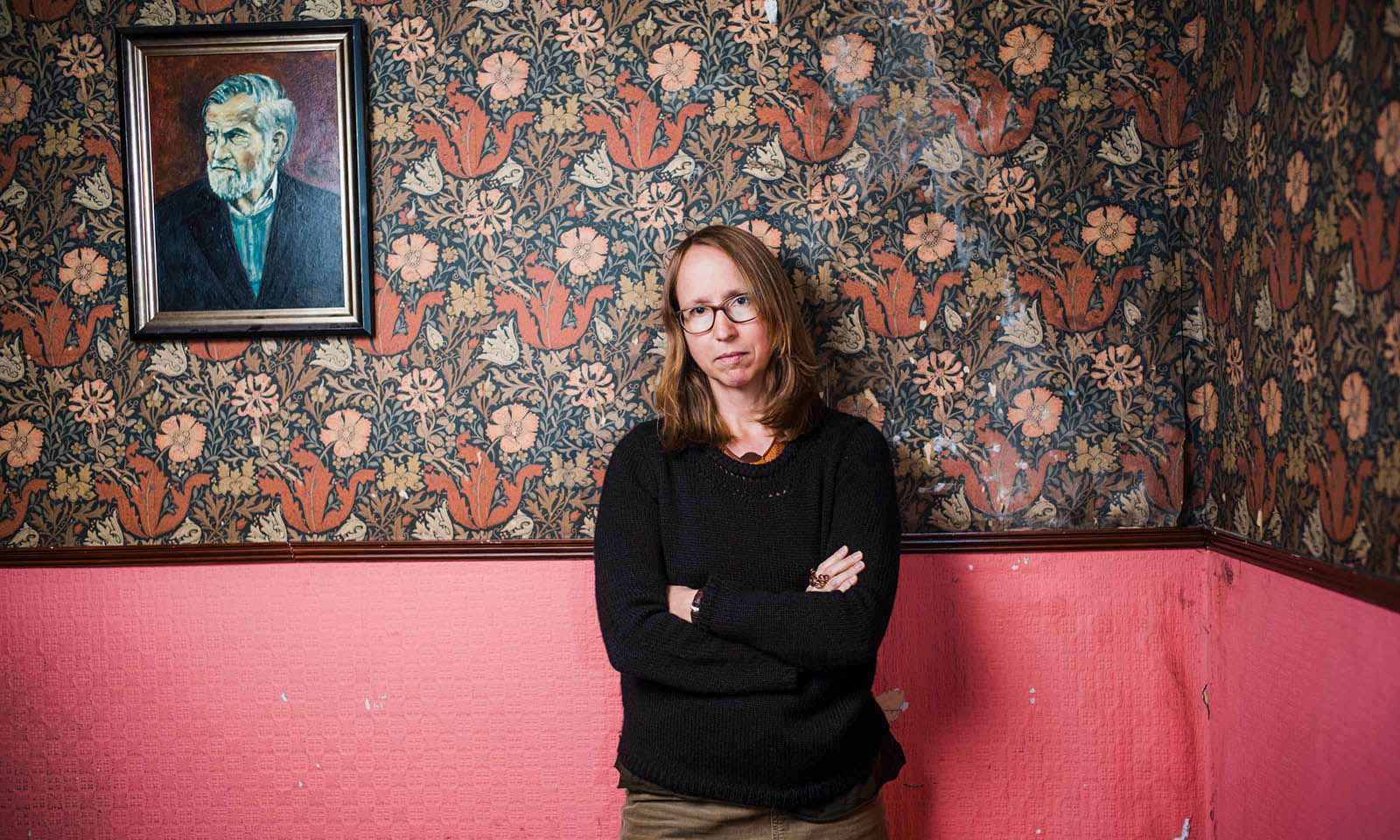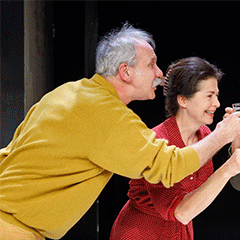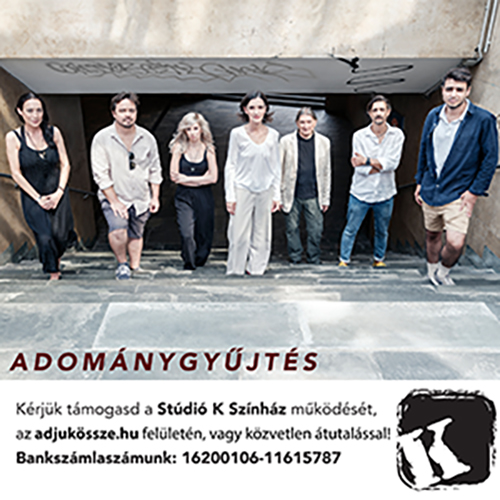More Crummy Spaces, Please!
In the second season of our project of American – Hungarian collaborations, we would like to continue to deal with the problem of how to approach the question of PC (political correctness) when it comes to the performing arts. What is ‘diversity’ and how diversity appears? Who are the performers, directors, writers? How can we reconcile aesthetic freedom and the ethical need for diversity? These are burning issues today that László Upor explores with American artists, curators, and teachers of artistic higher education in the interview series continued at SZÍNHÁZ.
Anne Washburn is a California-born, New York-based playwright. Interviewed in a rehearsal room at Playwrights Horizons NYC. In 2004, as part of an exchange program, she spent a month in Budapest where her play, The Internationalist was workshopped and read by Krétakör Theatre, directed by Árpád Schilling.
Anne Washburn, a New York based playwright in conversation with Laszlo Upor, dramaturg, translator and university professor from Budapest.

Photo: Beowulf Sheehan/PEN American Center
What in your opinion is missing from the American theater most?
What we’re missing, certainly in New York but I think in many theater cities throughout the country, is cheap crummy spaces – and I think the crummy part is important. We’re missing the crummy space where you can go in and it’s crummy and you can rehearse for very cheap or for free for as long as you want and make crazy shit and then put it up in front of an audience of whoever.
We’re missing the setup where you can just set up shop someplace and make theater for a box office split, but we’re also missing the local economy where you can work part time and working part time is enough to pay your rent, and then you have all the rest of your time to make theater in these cheap crummy spaces. Like the ruin bars in Budapest.
Back when you did this residency in Budapest, right?
Yes. Are those still around? They were wonderful. You know, that was exactly right as a place to make theater very productively. Or at least it certainly seemed to me that way, very conducive to creative functioning. They were cheap to use and not huge spaces, so you could fill the house every time. And there was the great bar downstairs.
I think for people who are starting out to make theater, or for people who have been making non-institutional theater or experimental theater, it’s now so much effort to hustle together a production, it takes so much bandwidth to get one thing up and I feel like, especially in your 20s and 30s, you need to be making as much theater as possible as often as you can because you’re learning so much from every production you do. It can’t just be a once a year thing. And we don’t have the conditions for that at this moment. So, this is discouraging, it eliminates a lot of possibilities, it puts up a real class barrier for one thing, but also it puts up a confidence barrier. Only the most confident survive, and I value the voices of the confident, but I think there are many interesting theater people who are more tentative beings and I want to hear those voices as well.
Why and how did that happen? That subculture once existed; how did it disappear?
I think it’s a bunch of things. Look at New York. New York has always been an expensive city, but it’s been both a very wealthy and a very working-class city simultaneously, that’s always been an important part of the energy of New York and, for a variety of reasons, it is less and less so. Rents have gone way up, and the cost of living has gone way up. The rents for venues also.
Our system is particularly crazy at the moment. In a lot of ways, the institutional theaters and Broadway and the craziest, most experimental works are all in a sort of intriguing balance with each other, which I don’t think is recognized by any of them. I think they feel that they are very separate systems. I think we’re an ecosystem which is more connected than we realize, but which is deeply broken. The inefficiency of the American political system is deep and by design. And the inefficiency of the American dramatic system is extremely deep, not by design. And I think at the moment, desperately deeper than it needs to be. Here let me show you this project I’m working on right now. All of these notes on the walls. This is a kind of crowd sourcing project structured like those evidence boards they have on cop shows where they organize all their evidence on bulletin boards and connect everything with red string and pace in front of it and it helps them solve the crime. This is a version of that for this time of current theater turmoil – we had it up for a week at Playwrights Horizons and people have come in and put up notes about whatever they’re thinking about all of it. We’ll do it again for a week at the Prelude Festival of experimental work curated by Frank Hentschker of the Segal Institute at CUNY.
So, what is represented on your wall is this inefficiency?
It’s kind of everything which is wrong with American theater, but also everything which could be right. All of the factors. This evidence wall idea you know it’s a fiction of films and tv. Real cops have too many investigations and not enough wall space. But it’s an intriguing way of organizing material, like a slow-motion Twitter feed, but with all of the parts operating at the same time like one big confused human brain. It’s informational for sure, you do get to find out more about what people are thinking, but it’s also meant to provoke you to make connections you might not otherwise make.
And I’ve always wanted to stick things lots of things on walls.
But this is not a project that will eventually lead to a production or an essay, right?
I think it’s powerful as long as it isn’t documented. When people come in, there are two rules. One is, nobody should feel obliged to look at all the postings. You should stay only as long as you feel interested, then go. The other rule is that nobody can bring phones into the room. Because what we do with our phones these days is, when we see something that looks really intriguing or interesting, we think, oh wow, I need to think about this more deeply: I’ll take a picture of it with my phone, and then I’ll look at it later and I’ll reference things and I’ll go down that rabbit hole. But we never ever do. In general, to take a picture of something with your phone is to eliminate it from your consciousness. Here in the room, you look at one posting, you look at another posting, you look at a third, you become agitated, you want to find a way to dismiss that agitation from your brain. The phone will do that. Without the phone you’ll hopefully take that same feeling of agitation and channel it into contributing your own thing to the wall.
There’s a line in Tony Kushner’s Angels in America that goes, America is the melting pot where nothing melts. What is your comment on that?
I think that’s very true. Or I mean it’s so complicated. I was looking at an article which was talking about how even when you think about just white European culture in the United States, an underrecognized fact is that within white European culture, there are a number of distinct subcultures. All of which have their own ways of operating and all in their own sets of historical factors. I don’t mean just initial national background though that can be part of it. It’s partly initial cultural background, it’s partly regional development, it’s regional history within a region. There’s this fantasy on the right that there’s this white national core to this country, once you have scrubbed away the First People. But these multiple waves of white immigration are in many ways as antithetical to each other as they are to any other set of cultural waves. There are shared American facts, and there are still lingering shared cultural references which are rapidly evaporating but Americans don’t have a culture. And the great thing about culture, as the name implies, is that it performs a lot of structural functions, but it also performs a lot of digestive functions. And so no country needs culture more than America, because culture is the way that we begin to massage underlying conditions into one loose, comprehensible point of common reference. We haven’t melted, no, we’re a conglomeration, held together by economic momentum and at the moment with a bad case of acid reflux.
If it was your call, would you urge things to melt, so it becomes a real melting pot? Or would you rather keep the elements slightly apart in a coexistence?
That’s a deep question. I mean, things do need to melt a bit, obviously.
Obviously.
But we gain a lot from intact traditions and cultures. What the left likes to say in America is that our diversity is our strength and that’s quite accurate. What we do not like to say on the left is that harnessing the power of our diversity is our strength, but it’s also a complication. It’s a source of friction. And it requires effort. I don’t think we like to acknowledge the work of our complexity.
Which is quite stupid.
Which is quite stupid. It’s a high caloric output. It’s worth it. It is, in fact, an enormous source of power. But I think we have to look realistically at what that involves. If for no other reason than because if we don’t, then the fact of friction becomes something that pernicious elements on the right can reinterpret. So, I don’t think there’s a way to answer that question because I think we are so lacking in vocabulary. The right doesn’t want to acknowledge that diversity is a power, so they are not developing vocabulary around that. And the left doesn’t want to acknowledge that complexity contains difficulty and so we aren’t developing vocabulary around that. And what it means is that there’s no way of talking about what’s the most both efficient and heartfelt way to manage a situation which is to our advantage. There’s a lot of emotional inarticulacies. In the same way that a lot of people are stronger than they know, but to the degree that they fear their own weakness, they disable themselves.
Is there any other place in or outside this melting pot where you feel home?
I haven’t been to many other places so I don’t really know. I feel like every place I’ve travelled to has felt seductive and had elements I would want in a home and don’t have here, but in a different way, and not completely. I’m one of those people who wishes I could run eight lives simultaneously because there are all these different places I would like to live and be in, inside and outside of the States, and in all these different ways. New York is its own thing. Young artists, when they came into the room, have talked about how they find New York frustrating and impossible. But on the other hand, for all that New York is frustrating, many have said that New York is the only place where there are tons of other people who are as obsessed with the question of theater as they are. So, I think New York doesn’t feel tenable, but moving out of New York feels complicated.

Photo: Sarah Lee/ The Guardian
We’re in search of a delicate balance, right? Home and away, the necessary solitude of the author versus the hunger for collective experience, working with colleagues? To interact, to exchange ideas to get new impulses. I wonder if, as a playwright, you need that constant change.
Playwrights are a weirdo hybrid kind of author. I think novelists really need stability to write, because they need to sustain a certain kind of energy over a long period of time. I feel like poets are more reclusive or explosive. Playwrights are generally this sort of weirdo version of introvert extrovert, which both needs and wants and thrives upon community, but really needs to get away from community. You can’t get the mix right. You’re always among people saying, oh, if I could only get away and you’re always away thinking I wonder what interesting thing is going on. I think it’s about a stimulating level of discomfort.
Your travels in the United States and beyond are travels in space only? Or, because of the various cultures and various political systems, they feel travel in time as well?
Every time you travel you learn thousands of things. But you’re also always aware of how much you’re not understanding. Which I also love about travel. You know, the amount of mystery is incredible. And then, of course, in theory that same mystery you should be applying to your own New York. If I think about it carefully, New York is extremely mysterious to me. There’s a thousand ways I don’t know it. There’s a lot about American culture I don’t understand though I understand it better for having traveled. But I think even just the best practices part of it is huge. You hear that they do things differently elsewhere, but when you actually experience it it’s enormously more informative.
The idea behind your Budapest residency back then was exactly this: why don’t we turn the disadvantages of cultural differences and language barriers into an advantage and learn how actors from a different culture react to the script and give less obvious feedback and contribute in various ways. We need unexpected reactions and feedback, the everyday little surprise.
The Hungarian theater system also. I spent a month with Krétakör and I was able to see most of their repertoire because they have a repertoire. In one month, I was able to have a deep dive into their work which would never be the case with an American company. If you spent a month with an important American theater group, you’d see one show of theirs at best. It’s so frustrating cause you’ll see incredible shows in New York, from time to time, and they’re up for three weeks, six weeks, and then they’re gone forever. The inefficiency, the deep waste. And also, what it does to actors, like seeing the Krétakör actors and how by virtue of being together doing show after show they had all become fascinating actors. Just all the ways in which that structure reinforced craft and talent and capacity and ability was amazing. And the degree to which I became aware that we couldn’t offer anyone traveling this way anything like the experience I had there? That was helpful to see.
We all need to belong. And you did belong and still belong to several art groups What are the most important creative companies and associations that helped you or inspired you?
Something which was huge for me when I came out from my Graduate MFA was Soho Rep, which is now a very famous theater company in the city but at the time was not. They were doing weird downtown work, not performance but strange plays, and outside of downtown no one cared. They had just started a writer-director group, where you’d have 5 directors and 5 writers, and you’d meet over nine months every other week in somebody’s living room and people would read work. The writers and the directors in that group were all interested in alternative theater making and alternative dramaturgy at a time when New York theater culture was not interested in that at all. Everyone was making wonderful work no one else cared about but which we knew was exciting. So that was important reinforcement for a weird way of making theater and in one way or another my first three productions in New York came from work I made in the group and people I met through the group. And then I was part of a group called 13 P which was formed when the wonderful playwright, Madeline George went to this playwriting development program called the O’Neill in Waterford, CT and met Rob Handel, who’s also a wonderful playwright with a lot of experience in grant writing and theater management. They, in common with many other playwrights at that time, were irritated that major theaters couldn’t commit to productions of new work – it felt like plays were endlessly developed, rather than done. So, they decided to pull together a group of playwrights and pledged to produce all their plays and the singular thing of it was that you, the playwright, could dictate the terms of the production. You selected your director, you could choose your designers, you could choose how it was marketed. You were the creative decisionmaker on it. That was a very heartening and inspiring thing to be a part of. And then I was office manager at the Flea Theatre and with some other playwrights we were running playwriting and writing workshops in which really interesting writers would come in and give you writing exercises. The idea was just to find a way to generate material, and that somehow led to these silent playwriting retreats, run by the magical Erik Ehn, which are crazy and great — I ended up volunteer managing those for years and years and years.
With all this, how do you find the time for working?
I tend to write in bursts or work in bursts. If I’m seriously working on the project, I will put in the time every day. But I try to do it in a consolidated fashion rather than every day working on a different thing. I think all writers are different, but I value maniacal concentration over shortish periods of time over steady application of effort. Which obviously is from my description of all the different ways I’d like to live: both a feature and a bug at the same time.
What if I repeat my first question? What is missing from American theater the most?
Do you say this because you feel I’ll have come up with a different answer after all of this?
You may.
Yeah, it’s the same thing. More crummy spaces where people can make more things. There is so much to be said right now. And the theater is a particular way of saying things. It’s a thoughtful way of saying things. It’s a very human way of saying things. It’s a more economical way of saying things than many other mediums. And I think we need more of it. And we need more people to be making it and making use of it. Open doors into strange crummy rooms which are filled with possibility. I suppose the possibility of themselves. We need more theater for more people and for that to happen, we need it to be more accessible, the making of it. Also, we need affordable ticket prices at professional theaters perhaps that’s the main thing, otherwise theater is just removed from the larger cultural conversation.
Is there a duty that theater fails to accomplish? That is, something theater owes to the society, to humankind, to you in in Brooklyn – something that only theater could do, something theater should do and still doesn’t?
Theater is a form of astonishing potential. And it’s never fulfilled and it’s impossible to fulfill. So yeah, it’s failing. And it inevitably fails, you can never make the ultimate piece of theater. It’s impossible. It’s true, with any art form, I guess. Does theater have a duty to society? I don’t know. That is a question which is antithetical to our theater culture. That’s not true.
It may be a pointless question…
I can’t quite separate the question from the question of topic. Does it mean like theater should address topically the issues of society and the issues of the day? I think in some ways that prompt is a very exciting one, and I think in some ways that prompt can be a very deadly one.
My point: theater could be a very effective form of urging people, or helping people, to actually think. That is, analyze and look at things from different angles, instead of giving immediate response. And I don’t think theater fulfills this. If it’s done the right way, it will not give direct answers, but it may help you ask the right questions. And I don’t think we are good enough in doing this very often. Instead, we suggest the “right” response, offer answers and help people make judgments.
Right. Yes. The idea that theater can be instructive is very seductive. I don’t think any piece of theater ever changes a person. I think that the discussion around a piece of theater can change a person. I feel like sometimes artists will want to put the end point of the discussion in the play. And I think of the Greeks. Those Greek tragedies, they’re set up so that you don’t leave them satisfied. The most pernicious question among American audiences right now is, “what did I leave the theater with? What did I learn? I want to leave the theater with something.” And I think in fact, the way the drama was originally structured is that you leave the theater with a vexing question, not an answer. But the way the Greek theatre was also set up was the entire city would go to see it. And then the next morning, everybody would argue about what they had seen. But what we have here in the professional theater at least is people come from all over the city, they’re strangers and they sit in the house together and they see a thing and then they leave, and they may discuss it with the people they saw it with. But because theater is so irrelevant it’s not generally part of the wider discussion. I think you’re right. I think theater should leave you with questions and feeling vexed. And I think that’s the form of education. But I think if you don’t have the arena in which those questions can be dealt with or articulated, then it’s not going to move thought forward. So, it’s sort of a social question. In some ways, it’s the theater structural question. It’s an enormous problem that, yes, we have an entertainment culture that becomes segmented. Because it used to be, we all knew what those movies were and what those songs were. Across the country. Generationally. And increasingly we have fewer and fewer and fewer of these things in common and the younger you are, the fewer of them you have with anyone else and with other generations.
I think as artists we have to challenge ourselves as we challenge audiences. I think that writing from a place of any certainty whatsoever is problematic. I think we should write from our uncertainties, not our certainties.
I believe in helping audiences understand that they cannot expect any solid solutions or answers. Instead of suggesting that I want you to think this or that way it must be very, very clear that I want you to think. And I don’t only mean rational thinking. Obviously, the sensuous and emotional knowledge and rational knowledge are of the same complex.
It is, and I think we have to give over the idea that we can ever control or even contribute to what someone else is thinking. We can only share our own thoughts or emotions or sensations or… intimations. I think we’re here to complexify the argument.






